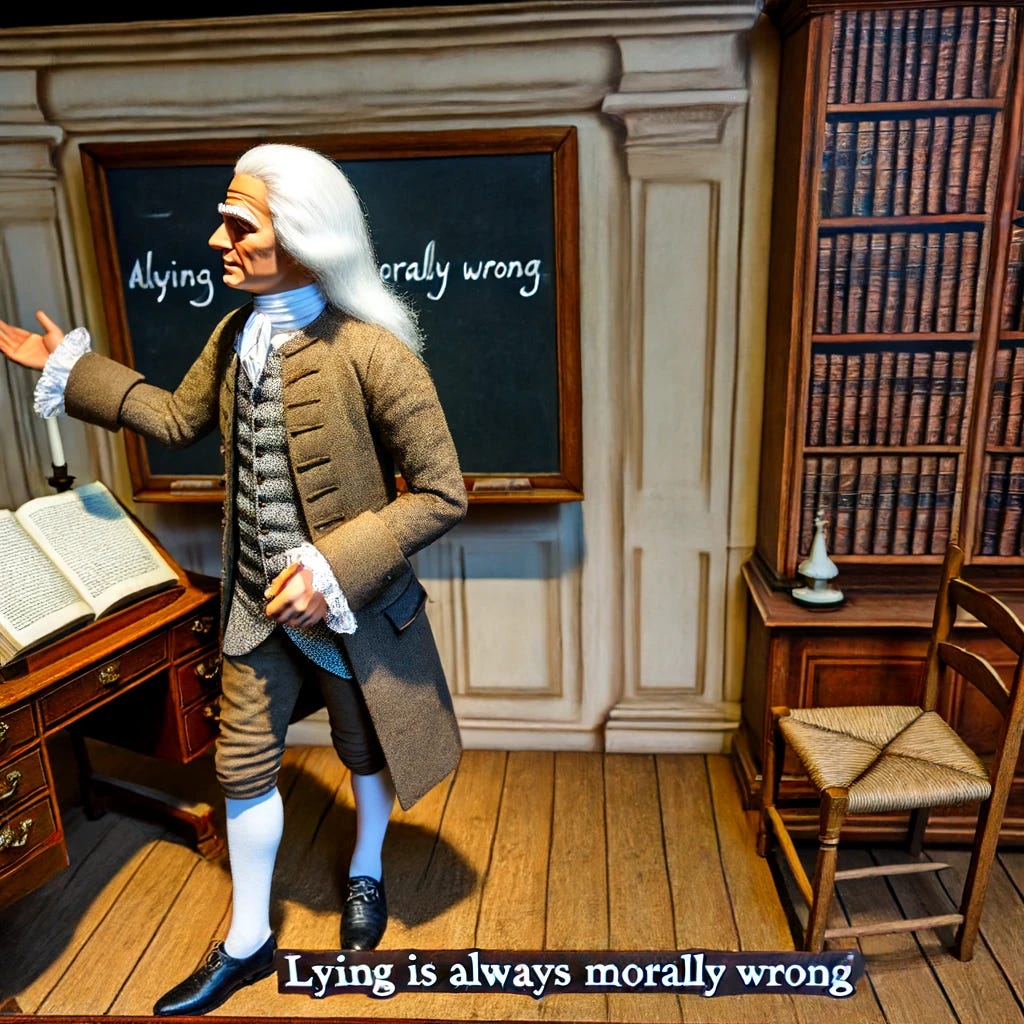Immanuel Kant strongly held that lying is always morally wrong. Many people do not share this view, holding that even though lying is mostly morally wrong, there are cases where it looks morally justified, if not essential. A chief argument Kant gives—in The Metaphysics of Morals—to show that lying is morally wrong holds that,
Lying (in the ethical sense of the word), intentional untruth as such, need not be harmful to others in order to be repudiated; for it would then be a violation of the rights of others. It may be done merely out of frivolity or even good nature; the speaker may even intend to achieve a really good end by it. But this way of pursuing his end is, by its mere form, a crime of a man against his own person and a worthlessness that must make him contemptible in his own eyes.
Here Kant is basically saying that lying to someone, even to achieve a morally noble end (e.g., lying to the Nazis about hiding Jews in the basement) is morally wrong due to the fact that lying weakens one’s moral character by creating psychological distance between them and the truth, and it uses other people as a mere means to an end, e.g., treating people like tools or objects, rather than as morally valuable entities who deserve to be treated with dignity and respect. Kant also argues that lying is wrong because if everyone lied, then lying wouldn’t work. So, if everyone cannot lie, since practice of lying would stop working, what makes you so special?
There are other reasons to think lying is always wrong—some believe God condemns lying across the board. However, I have always found an absolute, blanket moral prohibition on the practice of lying to be suspect. Of course, I agree that generally speaking, lying is morally wrong. You wouldn’t want someone lying to you, so then you shouldn’t lie to others. But that only applies to most cases, and does not show there is an absolute prohibition on lying. For example, I would have zero moral qualms about lying to Nazis who I knew were intent on murdering innocent Jews—to tell them the truth would be to enable and facilitate their evil designs. But this argument is an old one, and not likely to convince anyone to change their minds.
There is, however, a different argument against an absolution moral prohibition on lying. Perhaps it works, and perhaps not—but in either case, the argument is worth considering. Here it is, laid out in premise form:
There are just wars.
Deception is essential to war waged successfully.
Something cannot be morally wrong if it is just.
Deception is a form of lying.
Therefore, lying isn't always wrong
Each step of this argument—or something near enough—must hold for the argument to work. It is plausible that there are just wars, even though absolute pacifists would deny that is so. What about the claim—in the second premise—that deception is essential to (successfully waged) war? The Chinese military commander and military strategist, Sun Tzu, held that deception is the key to victory in war:
All warfare is based on deception. Hence, when we are able to attack, we must seem unable; when using our forces, we must appear inactive; when we are near, we must make the enemy believe we are far away; when far away, we must make him believe we are near.
The other premises are fairly self-explanatory. But they must be wrong. Do you agree or disagree? Where have I gone wrong? Let me know.



Interesting, though I'd think anyone who's willing to endorse an absolute prohibition on lying would just bite the bullet and say that this proves that there is no just war. If they're already willing to bite the bullet on selling out Jews to the Nazis, which seems much crazier than thinking there is no just war, they have no reason not to here.
I hadn’t considered this scenario. It makes me think of all games that require outright deception as a component of winning play, poker being the most obvious. But the game where I see this play out most explicitly might be television’s Survivor. In Survivor it’s nearly impossible to advance in the game without directly lying to people about your intentions, yet at the end of the game you win by receiving the most favorable votes cast by the people you invariably swindled and lied to in service of their elimination. Lying is explicitly part of the game, but many people find the manner in which they were lied to so distasteful they refuse to vote for the liar as winner, while others see the lie as an essential and smart maneuver that deserves recognition. For some contestants the context of the lying makes all the difference, for others it makes virtually none.